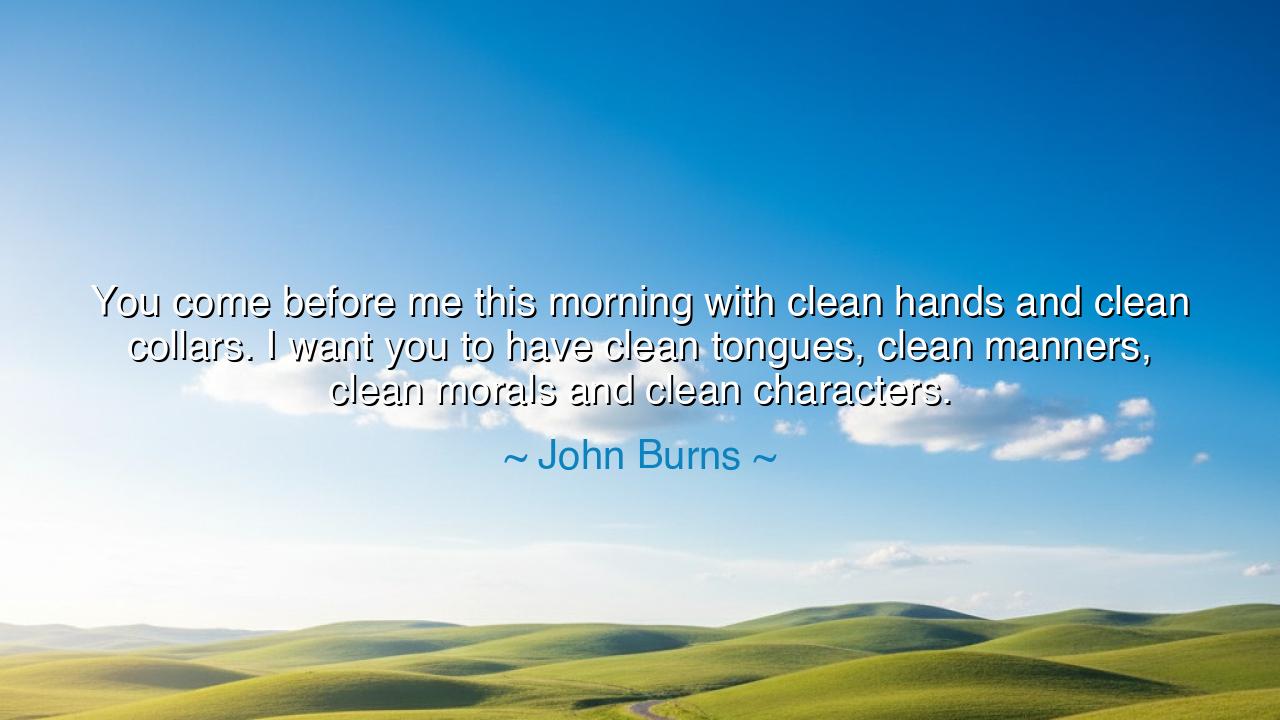
You come before me this morning with clean hands and clean
You come before me this morning with clean hands and clean collars. I want you to have clean tongues, clean manners, clean morals and clean characters.






"You come before me this morning with clean hands and clean collars. I want you to have clean tongues, clean manners, clean morals and clean characters." Thus thundered John Burns, the fiery labor leader of Britain, who rose from humble beginnings to speak for the dignity of the working man. His words, though simple in their surface, burn with a demand for inner transformation. For what use is it, he asks, if a man polishes his collar but allows his speech to be foul, or if his hands are washed but his character remains stained? Cleanliness of the body is visible, but cleanliness of the soul—this is the higher calling.
The clean hands and clean collars are but symbols of outward respectability, the trappings that society sees. These may deceive the eyes of men, but they cannot hide the truth of one’s spirit. Burns calls upon his audience to look deeper, to strive for clean tongues—speech free of lies and cruelty; clean manners—conduct that shows respect for others; clean morals—choices guided by principle, not corruption; and clean characters—lives rooted in honesty, integrity, and courage. His command is a call to wholeness: that the outer form must match the inner truth, lest men become as hollow vessels, polished on the outside but rotten within.
History gives us many examples of this contrast. Think of Marcus Aurelius, emperor of Rome, who wore the robes of power but sought above all the purity of his soul. In his Meditations, he reminded himself daily to act with justice, to speak with restraint, to keep his mind uncorrupted by vanity. Though surrounded by intrigue and corruption, he clung to the pursuit of clean character as more important than the purple of the throne. In him we see what Burns demanded: a leader whose outward dignity was matched by inward virtue.
By contrast, recall the court of Louis XVI of France, where wigs were powdered and collars stiffened, yet greed, arrogance, and disregard for the common people festered beneath the silks. Here were men and women who shone outwardly but decayed inwardly. Their failure to match outer respectability with inner justice led to the storming of the Bastille and the collapse of their world. Outward cleanliness cannot withstand the weight of inward corruption.
Burns’ words carry urgency because he spoke in a time of labor strife, when workers struggled for respect in the eyes of a society that often scorned them. To those men, he said: it is not enough to wash your collars for the inspection of your masters. Build lives of moral strength, so that when you rise to claim your rights, no one may justly accuse you of vice or dishonor. His exhortation is both practical and heroic: to clothe oneself not only in garments but in virtue, so that the dignity of the working class could not be denied.
The lesson for us is eternal. It is easy to prepare the outside, to polish appearances, to adjust the collar and wash the hand. It is harder, but far more important, to discipline the speech, to govern the manners, to live with integrity. The world will always tempt us to show only the surface, but the wise know that what lies beneath will always emerge. A clean character will outlast the finest garments.
Practical action must follow. Begin each morning as Burns’ listeners did: cleanse your body, but do not stop there. Ask yourself: are my words today honorable? Will my manners reflect respect? Will my choices be guided by principle? Will my character stand the test of scrutiny? Make these questions your ritual, as necessary as washing the face or tightening the collar.
Thus John Burns speaks across the ages: do not be content with outer polish. Strive for inner purity. For hands will soil again, collars will wrinkle, but the man or woman with a clean heart and a steadfast character will endure beyond the fashions of the day. And when you stand before the world, let them see not only the collar on your neck, but the light of integrity in your soul.






AAdministratorAdministrator
Welcome, honored guests. Please leave a comment, we will respond soon